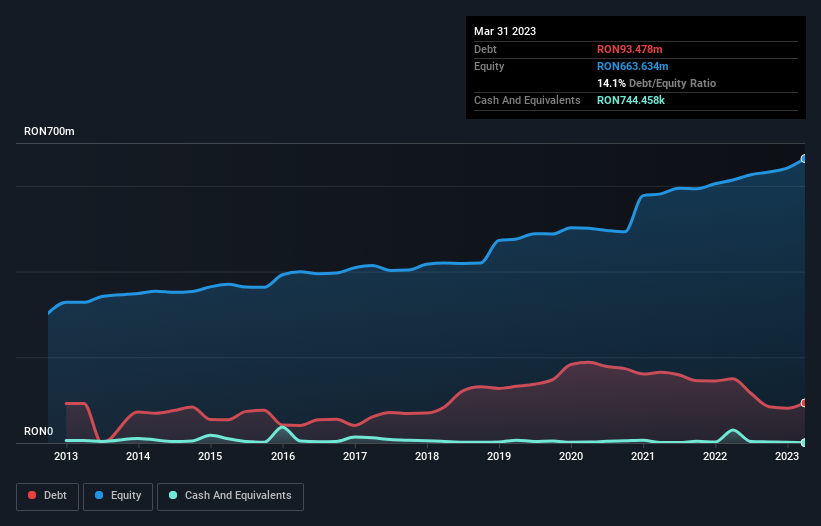These 4 Measures Indicate That Antibiotice (BVB:ATB) Is Using Debt Safely

Howard Marks put it nicely when he said that, rather than worrying about share price volatility, 'The possibility of permanent loss is the risk I worry about... and every practical investor I know worries about.' It's only natural to consider a company's balance sheet when you examine how risky it is, since debt is often involved when a business collapses. As with many other companies Antibiotice S.A. (BVB:ATB) makes use of debt. But should shareholders be worried about its use of debt?
When Is Debt Dangerous?
Debt and other liabilities become risky for a business when it cannot easily fulfill those obligations, either with free cash flow or by raising capital at an attractive price. If things get really bad, the lenders can take control of the business. However, a more common (but still painful) scenario is that it has to raise new equity capital at a low price, thus permanently diluting shareholders. Of course, plenty of companies use debt to fund growth, without any negative consequences. The first thing to do when considering how much debt a business uses is to look at its cash and debt together.
See our latest analysis for Antibiotice
How Much Debt Does Antibiotice Carry?
The image below, which you can click on for greater detail, shows that Antibiotice had debt of RON93.5m at the end of March 2023, a reduction from RON149.8m over a year. Net debt is about the same, since the it doesn't have much cash.

How Strong Is Antibiotice's Balance Sheet?
The latest balance sheet data shows that Antibiotice had liabilities of RON174.2m due within a year, and liabilities of RON76.3m falling due after that. Offsetting these obligations, it had cash of RON744.5k as well as receivables valued at RON256.6m due within 12 months. So it actually has RON6.93m more liquid assets than total liabilities.
This state of affairs indicates that Antibiotice's balance sheet looks quite solid, as its total liabilities are just about equal to its liquid assets. So while it's hard to imagine that the RON510.2m company is struggling for cash, we still think it's worth monitoring its balance sheet.
We use two main ratios to inform us about debt levels relative to earnings. The first is net debt divided by earnings before interest, tax, depreciation, and amortization (EBITDA), while the second is how many times its earnings before interest and tax (EBIT) covers its interest expense (or its interest cover, for short). This way, we consider both the absolute quantum of the debt, as well as the interest rates paid on it.
Antibiotice's net debt is only 1.1 times its EBITDA. And its EBIT covers its interest expense a whopping 18.1 times over. So we're pretty relaxed about its super-conservative use of debt. In addition to that, we're happy to report that Antibiotice has boosted its EBIT by 47%, thus reducing the spectre of future debt repayments. There's no doubt that we learn most about debt from the balance sheet. But you can't view debt in total isolation; since Antibiotice will need earnings to service that debt. So when considering debt, it's definitely worth looking at the earnings trend. Click here for an interactive snapshot.
Finally, a company can only pay off debt with cold hard cash, not accounting profits. So the logical step is to look at the proportion of that EBIT that is matched by actual free cash flow. Over the last three years, Antibiotice recorded free cash flow worth a fulsome 85% of its EBIT, which is stronger than we'd usually expect. That positions it well to pay down debt if desirable to do so.
Our View
Happily, Antibiotice's impressive interest cover implies it has the upper hand on its debt. And the good news does not stop there, as its conversion of EBIT to free cash flow also supports that impression! We think Antibiotice is no more beholden to its lenders, than the birds are to birdwatchers. To our minds it has a healthy happy balance sheet. Over time, share prices tend to follow earnings per share, so if you're interested in Antibiotice, you may well want to click here to check an interactive graph of its earnings per share history.
If you're interested in investing in businesses that can grow profits without the burden of debt, then check out this free list of growing businesses that have net cash on the balance sheet.
New: Manage All Your Stock Portfolios in One Place
We've created the ultimate portfolio companion for stock investors, and it's free.
• Connect an unlimited number of Portfolios and see your total in one currency
• Be alerted to new Warning Signs or Risks via email or mobile
• Track the Fair Value of your stocks
Have feedback on this article? Concerned about the content? Get in touch with us directly. Alternatively, email editorial-team (at) simplywallst.com.
This article by Simply Wall St is general in nature. We provide commentary based on historical data and analyst forecasts only using an unbiased methodology and our articles are not intended to be financial advice. It does not constitute a recommendation to buy or sell any stock, and does not take account of your objectives, or your financial situation. We aim to bring you long-term focused analysis driven by fundamental data. Note that our analysis may not factor in the latest price-sensitive company announcements or qualitative material. Simply Wall St has no position in any stocks mentioned.
About BVB:ATB
Flawless balance sheet and fair value.
Similar Companies
Market Insights
Community Narratives



